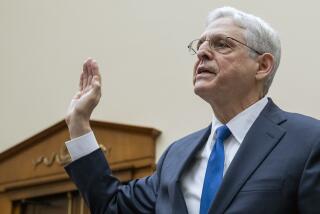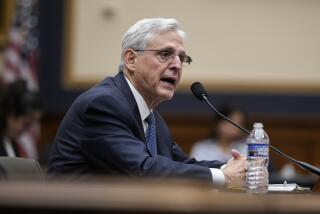FBI Agent Says He’s Ruby Ridge Scapegoat : Hearing: Official who led siege claims the bureau engaged in damage control over killing of wife. Testimony comes as four more take 5th Amendment.
- Share via
WASHINGTON — Likening himself to a tuna thrown into the sea to satisfy “hungry sharks,” the ranking FBI official at the 1992 Ruby Ridge, Ida., siege said Tuesday that the bureau engaged in “damage control” when questions were raised about the killing of an unarmed woman by an FBI sniper.
Testifying publicly for the first time since his May 3 letter to a Justice Department internal watchdog complaining of a cover-up and of being made a scapegoat, Eugene F. Glenn told a Senate panel that the FBI’s investigation of the incident was “twisted” to see “who do we blame?”
“I have a feeling--it’s just my belief--that there were damage control assessments that took place,” said Glenn, who was removed as Salt Lake City field office boss and transferred to Washington over the actions taken by the FBI at Ruby Ridge.
Glenn’s testimony before the Senate Judiciary subcommittee on terrorism came as four more FBI officials involved in the siege took the unusual step of invoking their 5th Amendment privilege against self-incrimination rather than testify. Brendan V. Sullivan Jr., attorney for the four, said there also was a “security” question involving one of his clients.
He told the subcommittee that a death threat had been made against Richard Rogers, commander of the FBI’s hostage rescue team at Ruby Ridge, a subcommittee source said.
Last week, Lon Horiuchi, the FBI sniper who killed Vicki Weaver as she stood hidden by the door of her husband Randy Weaver’s cabin, took the 5th Amendment because of the criminal inquiry being conducted by Boundary County, Ida., prosecutor Randall Day into what took place at Ruby Ridge. Like Horiuchi, the four FBI officials were allowed by the panel to invoke their 5th Amendment privilege against self-incrimination in a closed session, as Sen. Arlen Specter (R-Pa.) said there was no intent to “humiliate” them.
The FBI hostage rescue team, including the snipers, were summoned to Ruby Ridge after Deputy U.S. Marshal William Degan and Weaver’s 14-year-old son, Sammy, died in an Aug. 21, 1992, shootout. This happened as the marshals tried to initiate a plan for arresting Randy Weaver, who was wanted on gun charges and who had vowed not to be taken off his mountain.
In testifying about how the bureau handled the aftermath of the siege, Glenn said: “Maybe we could say that the ship saw some hungry sharks swimming close by and they decided that they would put a few tuna out and see if they could satisfy them.”
Normally, FBI agents can only use deadly force to protect themselves or others from death or grievous bodily harm. But at Ruby Ridge, a special policy was adopted under which agents could shoot to kill any armed adult male outside the Weaver cabin.
Glenn, a 26-year FBI veteran, said that he had discussed permissive shooting rules adopted for Ruby Ridge with then-Assistant FBI Director Larry Potts and that Potts had approved them. Potts has given varying testimony about his role in approving the rules, largely disclaiming responsibility.
Potts subsequently was censured by FBI Director Louis J. Freeh for management failure over Ruby Ridge but was then promoted by Freeh to deputy FBI director. However, he later was removed as deputy and suspended with four other FBI officials amid a Justice Department criminal inquiry into whether they lied about Ruby Ridge.
Glenn’s testimony that he had never been asked during internal FBI inquiries whether anyone had approved the loosened shooting rules was called “astonishing” by Sen. Herbert Kohl (D-Wis.), the ranking Democrat on the panel.
In addition to former Hostage Rescue Team commander Rogers, those invoking the 5th Amendment included William D. Gore, now assistant director in charge of the FBI’s inspection division; Stephen P. McGavin, former deputy commander of the team, and Lester B. Hazen, an agent on the team. Specter said none of the four sought congressional immunity in return for testimony.
Duke Smith, a Marshals Service official, said he discussed the shooting rules, known as the rules of engagement, with Rogers on a flight from Washington, D.C., to Idaho. Smith quoted Rogers as saying: “We have one federal marshal already dead. I don’t want my people to think they have to take incoming rounds if they feel threatened.”
More to Read
Sign up for Essential California
The most important California stories and recommendations in your inbox every morning.
You may occasionally receive promotional content from the Los Angeles Times.













